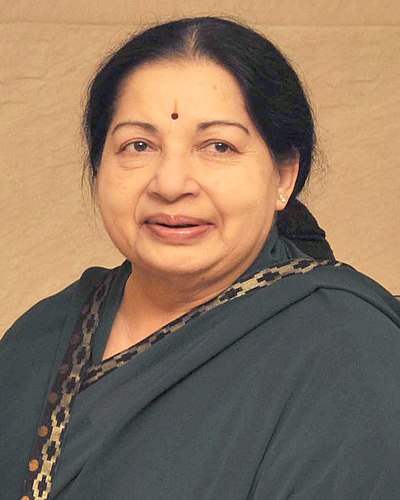
Search
2014 Indian general election in Tamil Nadu

The 2014 Indian general elections for Tamil Nadu's 39 seats in the 16th Lok Sabha were held on 24 April 2014. The All India Anna Dravida Munnetra Kazhagam led by its general secretary J. Jayalalithaa won a spectacular victory, taking 37 of the 39 seats. The total electors in the state of Tamil Nadu for the election was 55,114,867 and 73.74% of voters exercised their right to do so. The results of the elections were declared on 16 May 2014.
Overview
As the term of the 15th Lok Sabha ended in May 2014, the Election Commission of India decided to conduct the election for the 16th Lok Sabha in 24 April 2014.
The election process is carried out by the state election commission headed by Praveen Kumar, and for the first time, Section 144 of the CrPC was used in the election for 36 hours before polling to prevent cash distribution to bribe voters. As of 23 April 2014, the commission had seized ₹39 crore in the state.
Schedule
Parties and alliances
- All India Anna Dravida Munnetra Kazhagam (AIADMK)
In the beginning of the year, All India Anna Dravida Munnetra Kazhagam's general secretary J. Jayalalithaa stated that she would campaign and win all 39 seats by allying with CPI and CPI(M). Members of the AIADMK party declared her the prime ministerial candidate, despite rumors that she might support Narendra Modi. On 24 February 2014, the date of her birthday, she announced candidates for all 39 Lok Sabha constituencies in Tamil Nadu.
- National Democratic Alliance (NDA)
The Bharatiya Janata Party-led National Democratic Alliance, with Narendra Modi as prime ministerial candidate, formed an alliance with Desiya Murpokku Dravida Kazhagam (DMDK), Pattali Makkal Katchi (PMK), Marumalarchi Dravida Munnetra Kazhagam (MDMK), Indhiya Jananayaga Katchi (IJK), Kongunadu Makkal Desia Katchi(KMDK) and Puthiya Needhi Katchi (PNK). The seats were allotted on 20 March 2014 in Chennai by the national president of the Bharatiya Janata Party and the former chief minister of Uttar Pradesh Rajnath Singh.
- Democratic Progressive Alliance (DPA)
The Dravida Munnetra Kazhagam-led Democratic Progressive Alliance, under the leadership of M. Karunanidhi withdrew its support from the Indian National Congress-led United Progressive Alliance government on 19 March 2013 over Sri Lanka issues. On 25 March 2014, DMK also expelled its south zone organizational secretary and the former minister of chemicals and fertilizers of the Republic of India M. K. Alagiri from the party for violating party discipline. DPA formed an alliance with Viduthalai Chiruthaigal Katchi (VCK), Manithaneya Makkal Katchi (MMK), the Indian Union Muslim League (IUML), and Puthiya Tamilagam (PT).
- Indian National Congress (INC)
The Indian National Congress under the leadership of Rahul Gandhi stated that they would decide the prime ministerial candidate after the election. They lost their major ally, Dravida Munnetra Kazhagam last year. So INC decided to contest alone in all 39 seats in the state. The minister of shipping of the Republic of India G. K. Vasan and the minister of finance of the Republic of India P. Chidambaram were opted out of the election.
- Left and Secular Alliance (LSA)
After six rounds of seat-sharing talks with All India Anna Dravida Munnetra Kazhagam for the Lok Sabha seats, the Communist Party of India (Marxist) and the Communist Party of India failed to bear fruit, and they opted to make an alliance of their own. On 14 March 2014 the two parties held a joint press conference in Chennai, declaring that CPI(M) would contest nine seats and CPI would contest eight seats.
Seat sharing of parties
Candidates
Opinion poll
Results
By Party
By Member
By Constituency
Analysis
The ruling AIADMK, after winning 37 out of 39 seats, emerged as the third largest party in the Lok Sabha, the lower house of the Indian Parliament. It had been recorded as the best performance by any party in the state after the INC, when it won 31 seats in the 1962 election. Prominent DMK leaders and former union cabinet ministers T. R. Baalu, A. Raja, and Dayanidhi Maran lost their respective seats. AIADMK's big success can be understood from the fact that, despite being a multi-cornered contest between AIADMK, NDA, DPA, INC, and LSA 33 seats were won by the party with a margin of more than 1 lakh votes.
However, AIADMK general secretary J. Jayalalithaa ruled out joining the new government of India led by the BJP-led NDA.
After the result of 1989 and 1991 elections, it was the third time that the DMK had no representative in the Lok Sabha. The same thing happened to INC when it drew a blank since the 1998 election. Similarly, the communist parties, the CPI and CPI(M), did not win any seats, their worst performances since the 1999 and 1996 elections, respectively.
The factors attributed to the sweeping result in favor of AIADMK were the implementation of various welfare schemes by the government led by J. Jayalalithaa and the hope people in Tamil Nadu had in her that she would protect Tamil interests.
Key positions held by elected members of parliament
Deputy speakers of the Lok Sabha
Union ministers of state
See also
- Elections in India
- Elections in Tamil Nadu
References
External links
- Official Website of Election Commission of India
- Election statistics provided by ECI
Text submitted to CC-BY-SA license. Source: 2014 Indian general election in Tamil Nadu by Wikipedia (Historical)
Owlapps.net - since 2012 - Les chouettes applications du hibou

